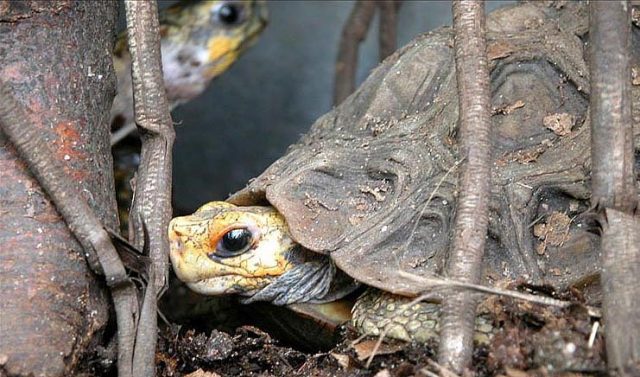Type the name of the breed you're looking for below
[wpdreams_ajaxsearchlite] Don't see the breed your're looking for? Click here and let us know!
Home’s Hingeback Tortoise
| Place of Origin and Range | It is found in Benin, Cameroon, Democratic Republic of the Congo, Ivory Coast, Equatorial Guinea, Gabon, Ghana, Liberia, Nigeria, and possibly Togo. |
| Description | A distinctive hinge of softer tissue on either side of the carapace. This allows the turtle to completely seal its hind legs within its shell. The carapace is usually a brown colour. |
| Morph Patterns Available | Yes |
| Adult Size | Can grow up to 9 in ( 22cm) |
| Accommodation | A filtered semi-aquatic cage with water temperature at 70-80'F(21-26'C), and a sloping ramp(driftwood, textured plastic or some other non-abrasive surface) leading from the bottom to an illuminated and warmed basking spot. Approx 80'F(27'C). 2 x 4 feet for an adult. |
| Lifespan | Can live 10+ years |
| Feeding / Diet | It may consumes plants and skim the surface of the water with its mouth open to catch small particles of food. Snails, crayfish, minnows, worms, insects, and prepared foods such as pelleted trout, catfish pellets, and koi goldfish pellets are all good choices. Along with small insects. |
| Other Considerations | Its natural habitats are subtropical or tropical moist lowland forests, subtropical or tropical swamps, and plantations. It is threatened by habitat loss. Watch for theses health concerns carefully with your tortoise. Vitamin A Deficiency: Vitamin A is an important nutrient for your tortoise’s health. It is found in his diet in the form of leafy green, orange or yellow vegetables, liver, and fish. If your tortoise is not getting enough Vitamin A, he can suffer serious health problems. Always check to make sure that your tortoise does not have swollen eyelids, as this is the main sign of a Vitamin A deficiency. Also, check for weight loss, nasal discharge and infected skin. Any of these symptoms could point to a deficiency. If you think your tortoise may not be getting enough Vitamin A, you should take him to the veterinarian to get a firm diagnosis. Shell Problems: Your tortoise's shell is very important to his overall health. There are many potential problems that could occur, so you should be on the lookout at all times. Respiratory Disease: Respiratory infections have symptoms similar to vitamin A deficiency, including swollen eyelids and runny nose, so you should take your tortoise to the veterinarian to get a proper diagnosis if you suspect either. More serious infections will be characterized by breathing through the mouth, mucus in the mouth, and wheezing. Always make sure your tortoise’s environment has the proper amount of humidity, as this will help prevent respiratory problems. |



